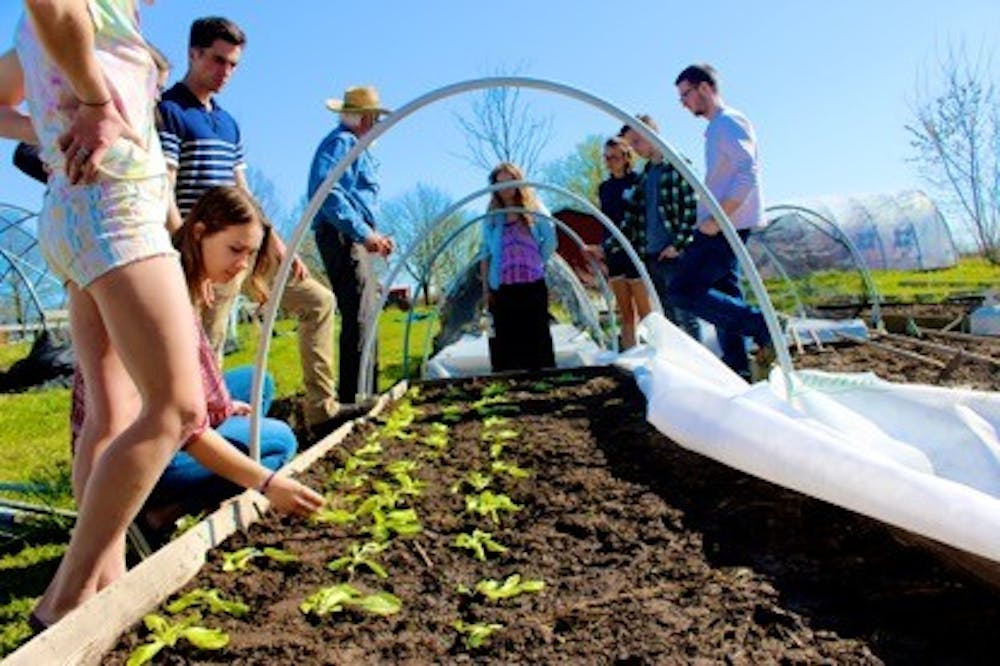Written by Abbey Gingras and Bonnie Meibers
First Harvest
Beyond Yager Stadium and across Four Mile Creek sits a vacant and dilapidated white farmhouse. Past that, through a scraggly line of trees, are 35 acres of farmland. This is the Miami University Institute for Food.
Lauren Wulker pulled up to the farm in her aptly nicknamed "Veggie Van" -- a bright red vehicle she uses for transporting the Institute for Food's (IF) crops. She had just dropped off some winter squashes at the ecology center for storage.
"We're in this phase of identifying the barriers and then trying to compromise," Wulker said as she walked through her rows of vegetables. She's the farm manager. "So for example, could [Dining Services] tweak their menu so that it fits the time frame that our produce is available?"
The farm is exploding with a variety of produce -- squash, cherry tomatoes, potatoes, kale and green beans, to name a few. Much of it was planted in the spring and summer months, when she spent every day on the land.
"We've been harvesting all summer, every day in 95 degree weather," she laughed. "We're just transitioning now into fall crop availability."
This summer, Wulker worked with four others. During the school year, more students are on the farm helping out with planting, harvesting and tending to the land. Students receive credit for their work, but the labor hours are intensive.
A passion for food makes it a little easier, though.
"I like bringing people together through something that is fundamental to humanity: eating," Wulker smiled.
Innovation through Food
Peggy Shaffer long hoped that Miami would have a new kind of agriculture school -- a place for students to practice sustainable farming hands-on by working with the land around Miami and supplying the university dining halls with locally-grown food.
Enjoy what you're reading?
Signup for our newsletter
"It just makes sense to me," Shaffer said. She is the co-founder of the IF and an environmental historian. "The farm, the house, the barn the land, are all among the plethora of assets that the university owns and can turn into an incredible program at a critical time."

The Austin-Magie farm | Photo by Bonnie Meibers
The university purchased the Austin-Magie property and house in 2004, but it wasn't until last year that the IF was born. The project began as the group of faculty and students coming together to think about the impact of society on sustainable growing and food systems.
The solution she and others saw was the IF -- and they got their opportunity when the university began seeking radically innovative and interdisciplinary projects; proposals that would allow different majors and groups of people to come together to start something new, something connecting the university to the community. The winning proposals would get time and, most importantly, funding.
"Food is, at its core, the most basic way humans connect and relate to their environment," Shaffer says. "It's also completely cultural -- it's about politics, it's about economics, it's about identity, it's about place, it's about family and tradition. The most meaningful way we relate to other people is to sit down and have a meal with them. That's where we began, there's nothing more interdisciplinary."
The IF was one of seven projects eventually chosen. It was granted $200,000 by the university and given three years to reach revenue neutrality. Already, the IF has received several major grants from private funders such as the Gross-Hutton Family Foundation based in Cincinnati, which will provide $150,000 over three years to the program.
With support from the university and outside donors, the IF students planted their first batch of crops in April 2016 -- potatoes.
Looking Ahead
"Right now we're building a farm," Wulker said. "But really we're building something bigger."
That something bigger includes the Austin-Magie farmhouse, which turned 175 years old in 2016.
Although the property was added to the National Register of Historic Places in 1982, it has been left mostly untouched since the university bought it. Lacking upkeep and care, the Austin-Magie House is quite literally falling apart.

The outside of the Austin-Magie House, which was built in 1841. | Photo by Abbey Gingras
Despite its historic status, the house is only protected from being destroyed with federal funds according to Smith Library of Regional History manager Valerie Elliott. That means the university can alter or demolish the building with private funds.
As part of the interdisciplinary nature of the IF, Shaffer and architecture professor Ben Jacks would like the house to become a real world studio of sorts for architecture students to do hands-on preservation work.
Some got their chance in March with a brief workshop at the house over spring break, like Christine Adler.
"A lot of us are really eager, thirsty even, to get our hands on something real," said Adler, who graduated in May. "If it was something that was made available to us, I think there would be a lot of interest. But we won't be able to know unless it becomes an option."
If the farm is not revenue neutral in three years, it may be shut down so the land can be cleared and used for other purposes. One option being considered is an indoor track facility.
Wulker, however, is trying to focus on realities rather than possibilities.

Lauren Wulker watering plants in the greenhouse | Photo by Carder Gilbert
"This year is about breaking the ground and piloting," she said. "We donated a couple hundred pounds of food to the Oxford Choice Pantry this summer."
The farm has also sold produce to Moon Co-Op, Quarter Barrel and Miami's Culinary Center.
Shaffer hopes that people will see the value of the farm beyond the revenue it generates.
"Are we educating students and preparing them to address the environmental issues that they will address in the future? And that their children will confront?" Shaffer asks. "We have an opportunity to be a leader here. And we should do it."
While there are still hurdles to overcome as the IF farmers work through their first growing season, Wulker is happy as long as the farm is bringing people together.
"The Institute for Food is about community partnerships and food for the people," she said, her shoes leaving a trace of herself in the soil she nurtures. "Not just some people. All the people."




